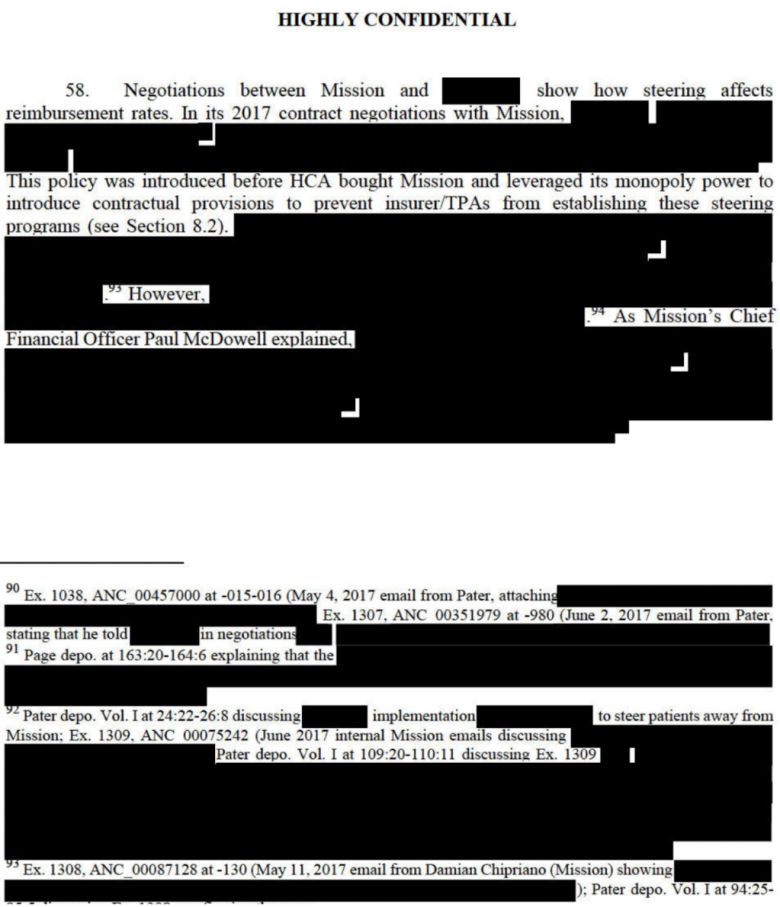Mission Hospital administrators were aware, before the sale, that HCA Healthcare intended to cut hundreds of staff positions once it acquired Asheville’s flagship hospital, including deep reductions to the nursing staff that caused Mission’s then-president to have “significant concerns,” according to depositions filed recently in a long-running antitrust lawsuit against HCA.
Jill Hoggard Green, a registered nurse who was Mission’s president and chief operating officer from 2011 until the sale of nonprofit Mission to HCA in February 2019, testified in a deposition earlier this year that she was “very, very concerned” when she learned that HCA was “working on building models related to reducing nursing.”
The sale to HCA led Mission to go “backwards” in staffing and quality, Hoggard Green testified.
In another deposition in the antitrust case, Mission’s former chief strategy officer, Jonathon Yeatman, testified that HCA’s initial plan was to cut the equivalent of approximately 800 full-time employees once the sale was finalized.
Mission Health had 12,061 employees at the time of the HCA takeover, according to Hoggard Green’s testimony, although it was unclear how many of them were full time.
The depositions are among more than 300 legal exhibits and expert testimonies that North Carolina Superior Court Special Judge Mark A. Davis cited this week as reason to deny, for now, HCA’s attempt to avoid a trial in the antitrust lawsuit brought by several western North Carolina residents.
Davis ruled Oct. 13 that “the interests of justice would not be furthered” by ending the case now without considering not just the narrow legal arguments of the lawsuit, but also all the effects of Mission’s alleged anticompetitive behavior on residents of western North Carolina.
Those effects, according to new documents filed by the plaintiffs, include reduced staffing, declining quality of care, and rising healthcare costs at Asheville’s Mission Hospital as part of what they contend is a deliberate effort by HCA to extract maximum profits by exploiting its near monopoly on healthcare in western North Carolina.
 Former Mission Chief Strategy Officer Jonathon Yeatman testified in another deposition that HCA Healthcare’s initial plan was to cut the equivalent of approximately 800 full-time employees once the sale was finalized. // Photo by Donn Jones/Vanderbilt University Medical Center
Former Mission Chief Strategy Officer Jonathon Yeatman testified in another deposition that HCA Healthcare’s initial plan was to cut the equivalent of approximately 800 full-time employees once the sale was finalized. // Photo by Donn Jones/Vanderbilt University Medical Center
“Contrary to Mission’s prior focus, HCA implemented several policies, including deep cuts to hospital staff, that decreased the quality of care at Mission Hospital,” a prominent healthcare economist hired by the plaintiffs as an expert witness wrote in his report. “HCA was able to anticompetitively reduce quality because of Mission’s monopoly power in the [Mission Health System] region.”
“As we’ve said before, we continue to believe the allegations are wholly without merit, and we will vigorously defend ourselves through the legal process,” Katie Czerwinski, an HCA Healthcare spokesperson, told Asheville Watchdog.
In rejecting HCA’s motion for summary judgment in the case, Davis v. HCA Healthcare Inc., Judge Davis (no relation to the plaintiff) indicated that the case would go to trial in 2026. The denial of HCA’s motion was “without prejudice,” meaning that the company retains the option of filing another motion for summary judgment before going to trial.
Davis’s ruling also clears the way for a class-action certification request, which, if granted, and if HCA is found to have engaged in anticompetitive behavior, potentially exposes the company not just to financial damages, but also to a demand to restore medical practices to the level of care that existed before it purchased the Mission Health system in 2019 for $1.5 billion.
“In a nutshell,” Judge Davis wrote, “this putative class action lawsuit has been brought by a number of North Carolina residents alleging that Defendants – through their ownership and operation of Mission Hospital in Asheville – have violated various provisions of Chapter 75 of the North Carolina General Statutes by engaging in anticompetitive acts regarding the provision of inpatient and outpatient services in western North Carolina.”
Documents detail change in key metrics
The documents made public in the latest filings also reveal:
The staff-to-bed ratio at Mission Hospital declined to just 4.7 in 2023 from 9.1 in 2018, the year before HCA took over the hospital, a “significant decline” compared with similar hospitals in North Carolina over the same period, according to a healthcare economics expert hired by the plaintiffs.
HCA’s deep cuts to Mission’s staff had a significant effect on patients’ perceptions of the care they received, as measured by the Hospital Consumer Assessment of Healthcare Providers and Systems (HCAHPS), a large nationwide survey of hospital patients. Mission Hospital ranked 9th highest statewide in patient satisfaction in 2016, but by 2022 and 2023 it had the lowest score in the state among all hospitals with 300 or more beds.
HCA’s staff reductions at Mission increased its net profit margins significantly, according to the hospital’s reports to the federal Centers for Medicare & Medicaid Services (CMS), to more than 10 percent in 2023 compared with approximately 0 percent for peer hospitals.
Within two years of HCA’s purchase, direct patient care staffing at Mission fell 36 percent, according to data from the National Academy for State Health Policy, a nonpartisan think tank.
Mission Hospital had a more significant increase in profits, steeper cuts to staff, and a more significant decline in patient ratings, relative to all other hospitals HCA acquired between 2016 and 2023.
The plaintiffs retained Robert J. Town, an economics professor at the University of Texas, and his Boston-based global consulting firm, Charles River Associates, which determined in their report last month that HCA-Mission did in fact have monopoly power in western North Carolina, and that it used that power to support anticompetitive behavior, leading to higher profits, higher healthcare costs, lower quality of care, and lower patient satisfaction.
A redacted version of the Town report was included in the plaintiffs’ filings. Under North Carolina law, details of business arrangements between insurers like North Carolina Blue Cross Blue Shield and providers like HCA Mission are considered trade secrets, and can be blacked out, or redacted, from public documents.
 State law allows healthcare providers and insurers to conceal details of their pricing and contracts as “trade secrets.” This document, included in exhibits filed in an antitrust case, Davis v. HCA Healthcare Inc., was redacted but appears to relate to Mission Health’s negotiations with Blue Cross Blue Shield of North Carolina in 2017.
State law allows healthcare providers and insurers to conceal details of their pricing and contracts as “trade secrets.” This document, included in exhibits filed in an antitrust case, Davis v. HCA Healthcare Inc., was redacted but appears to relate to Mission Health’s negotiations with Blue Cross Blue Shield of North Carolina in 2017.
Judge Davis also rejected a request by HCA’s legal team to disallow expert testimony from Town and other healthcare experts hired by the plaintiffs.
In their motion for summary judgment, HCA’s lawyers asserted that the antitrust lawsuit was in effect narrowly limited to alleged anticompetitive language in contracts between HCA and commercial health insurance providers. Because the contracts do not include anticompetitive language and specific terms — including tying provisions, gag clauses, and anti-tiering or anti-steering provisions — HCA’s lawyers argued, there was no anticompetitive behavior.
And because the case is narrowly focused purely on matters of law, HCA’s lawyers argued, there is no need for expert testimony about the effects of alleged anticompetitive behavior.
But “the interests of justice would not be furthered” by disregarding those effects, Judge Davis ruled.
Plaintiffs include William Alan Davis, Jonathan Powell, Faith C. Cook, Katherine “Katie” Button, and Brunk Auctions, Inc., all of whom live in HCA’s service region in western North Carolina. Each was a payor of premiums for commercial health insurance for themselves and/or their employees.
Nashville-based HCA is the nation’s largest for-profit hospital chain, with almost 200 hospitals across the United States, including Mission Memorial Hospital in Asheville, Angel Medical Center in Franklin, Highlands-Cashiers Hospital in Highlands, Blue Ridge Regional Hospital in Spruce Pine, Mission Hospital McDowell in Marion, and Transylvania Regional Hospital in Brevard. It also owns CarePartners, a rehabilitation hospital in Asheville.
Asheville Watchdog welcomes thoughtful reader comments on this story, which has been republished on our Facebook page. Please submit your comments there.
Asheville Watchdog is a nonprofit news team producing stories that matter to Asheville and Buncombe County. Peter H. Lewis is executive editor and a former New York Times senior writer, editor and columnist. Email plewis@avlwatchdog.org. The Watchdog’s local reporting is made possible by donations from the community. To show your support for this vital public service go to avlwatchdog.org/support-our-publication/.
Related

